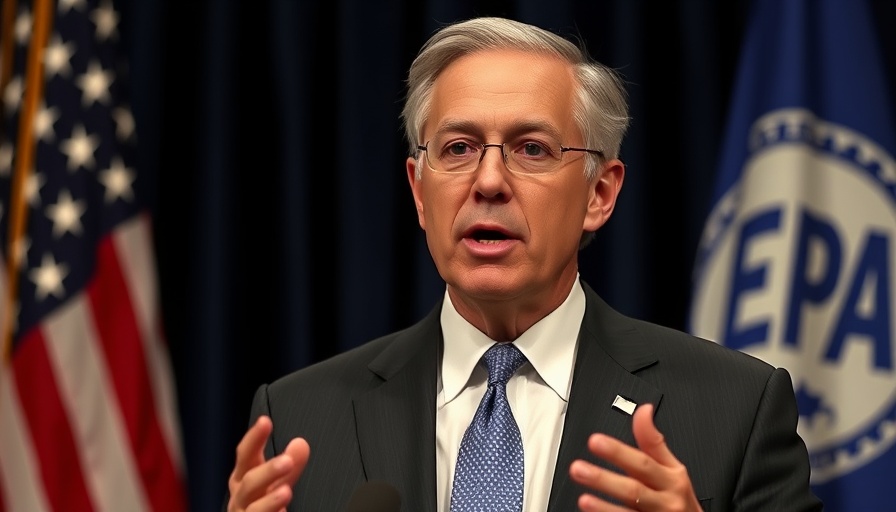
Introduction: A Historic Day of Deregulation
On a definitive Wednesday in March 2025, EPA Administrator Lee Zeldin unveiled plans for approximately three dozen deregulatory changes, heralding what he termed the "greatest day of deregulation in U.S. history." These proposed reforms, aimed at rolling back several cornerstone regulations intended to safeguard air and water quality, have ignited a substantial debate across the political spectrum.
The Landscape of Deregulation: Impact on Homeowners and Businesses
The sweeping changes are poised to reshape the regulatory framework that governs environmental protections, particularly as they relate to climate change and public health. Homeowners and businesses interested in solar and green energy may be particularly affected by these moves. Zeldin's push to reconsider stringent emissions standards from both vehicles and power plants suggests a pivot toward facilitating fossil fuel interests, potentially sidelining renewable initiatives that many energy-conscious homeowners have embraced.
Reconsideration of Power Plant Emissions: A Blunt Shift Toward Fossil Fuels
The announcement includes intentions to revisit the Biden administration's limits on emissions from gas and coal power plants. Under these previous regulations, existing power plants were required to reduce their greenhouse gas emissions significantly. The deregulation could lead to increased emissions, raising suspicions among energy advocates about the future viability of solar power as a cost-effective alternative.
Water Quality Concerns: The Struggle for Clean Water
The review of wastewater regulations for coal plants—a significant step in controlling mercury and arsenic in wastewater—could have grave implications for environmental health. As toxic metals from wastewater threaten both drinking water and ecosystems, the proposed rollback raises concerns among homeowners who rely on clean water sources. By easing wastewater regulations, the potential for contaminants to seep into local water supplies increases, prompting worries for residential communities and their access to safe water.
The Effects on Automotive and Transportation Regulations
Among Zeldin's most controversial moves is a reconsideration of tighter emissions standards for both light-duty and heavy-duty vehicles—strategies previously designed to promote the transition to electric vehicles (EVs). The current administration's vehicle regulations aimed to restrict air pollution from cars and trucks, a pivotal part of reducing urban smog and improving public health. By loosening these standards, Zeldin's directive not only undermines the transition to sustainable vehicle technologies—it potentially compromises the long-term environmental goals espoused by many forward-thinking homeowners.
Rights and Environmental Protections: Counterarguments and Public Health Concerns
Environmental groups quickly expressed outrage over the pronounced deregulatory thrust. Critics assert that the potential rollback of rules could exacerbate public health disparities, particularly in communities disproportionately affected by pollution. For homeowners who prioritize environmental preservation and health, the proposal represents a profound threat to the clean air and water standards that they often depend on for their families' well-being.
Future Predictions and Market Implications: A Turn Towards Fossil Fuel Dependence?
Looking ahead, the implications of these regulatory shifts are profound. Experts predict an era characterized by reduced investment in green technologies as businesses adapt to a regulatory environment that significantly favors fossil fuel interests. This could stall the growth of solar energy adoption and broaden the gap between energy innovation and consumer need for sustainable energy options. Homeowners reliant on green energy will need to navigate an increasingly complex energy market, unsure of federal support for renewable sources.
Actions for Homeowners: Navigating a Changing Landscape
With these transformative shifts looming on the horizon, it becomes crucial for both homeowners and businesses to stay informed and proactive. Engaging local advocates, participating in community discussions about renewable energy, and leveraging state-level resources for solar energy may provide pathways to sustainability despite federal pushbacks. As energy consumers, exploring local solar programs and incentives can offer grassroots solutions in a climate of uncertainty.
In conclusion, while the anticipated deregulation may aim to stimulate economic growth by rolling back what some view as onerous regulations, it poses significant risks to environmental safeguards that protect both public health and the integrity of the planet. The onus now falls upon engaged citizens and responsible businesses to advocate for their interests in the face of these policy shifts, potentially influencing the future landscape of energy consumption in America.
 Add Row
Add Row  Add
Add 




Write A Comment